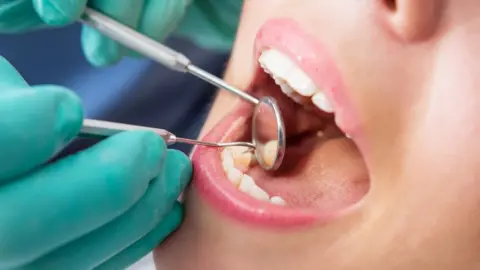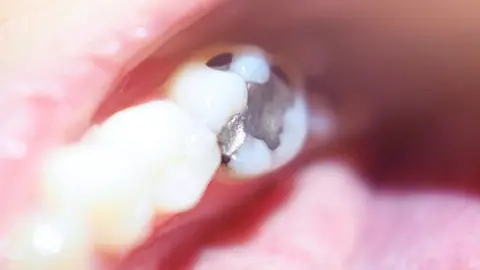NHS: NI dentists warn against EU metal filling ban
 Getty Images
Getty ImagesA proposed EU-wide ban on mercury would "break" the dentistry service in Northern Ireland, according to the British Dental Association.
The ban would prohibit the use of silver fillings or dental amalgam, with a move to mercury-free fillings.
It could be introduced next year after the EU said mercury posed a "global and major threat to human health".
But the British Dental Association (BDA) argued that NHS patients could be left without care.
According to the NHS website, dental amalgam is a mixture of metals including silver, tin, copper and mercury and is the most common type of filling used to repair tooth cavities.
The NHS also says that although amalgam fillings "can release low levels of mercury vapour, particularly when they are put in or removed, there is no evidence that exposure to mercury from amalgam fillings has any harmful effects on health".
However, the European Commission describes mercury as a "very toxic substance".
Under post-Brexit trading rules, aspects of EU law still apply in Northern Ireland.
'Shockwaves across Northern Ireland'
Representatives from the BDA appeared at Stormont's Windsor Framework Democratic Scrutiny Committee on Thursday.
They said that the vote to ban dental amalgam "sent shockwaves across the entire dental profession, and no more so than here in Northern Ireland".
They asked the committee to agree to an inquiry saying the ban posed "considerable risks in the form of irreparable and long-lasting damage to provision of dental services here".
 Ciara Gallagher
Ciara GallagherSpeaking to BBC News NI's Good Morning Ulster programme, Ciara Gallagher of the BDA said that amalgam was "an old-fashioned material" that was "tried and tested".
"It's been here for a century, it's safe, it's durable," she said.
"This is an environmental concern, which we totally understand but within dentistry there are a lot of mitigations for that.
"What we're saying is, yes keep going towards phasing it down but don't phase it out in 10 months because this service will completely collapse and the patients who depend on this service will have nowhere to go."

Why would this ban affect Northern Ireland?
The EU is banning mercury metal-based fillings (dental amalgam) in dentistry on 1 Jan 2025. The UK and NI want to keep using them.
When the ban comes into force, it will affect the UK because it will disrupt supply chains and make dentistry more expensive.
But this particularly affects dentists in Northern Ireland because of the protocol - it won't just be illegal to import mercury fillings, but to use them at all (except in exceptional circumstances).
Dentists in Northern Ireland say they're critically unprepared to work without dental amalgam, and that patient care will be affected.
Dentists in Northern Ireland are already at crisis point and lose money carrying out most routine surgeries and fillings etc, unless they're private.
Dentists say dental amalgam is safe and has been used for a century.

The worry for many dentists, Ms Gallagher added, is the time and money it takes to complete the new fillings if amalgam is banned.
A large, white filling on a back tooth in a private practice costs five times the amount of a silver filling in a NHS practice, she said.
 artorn/Getty Images
artorn/Getty Images"It also takes me three times as long to do a white filling than it does a silver filling," she added.
"So to introduce into the service a filling material which costs more and takes longer will break the service which is already so fragile."
Ms Gallagher said about 90% of NHS dentistry is currently provided by high street practices, which are stand-alone businesses and are also facing soaring costs.
But unlike other businesses, she added, practices cannot alter the costs as the service is provided on behalf of the government.
Tristen Kelso of the BDA told the Stormont committee that a planned, phased-down approach to dental amalgam was "the best and only option for public health, not least considering the immense strain already in dental services".
He also said there were "strong, clinical arguments why dental amalgam must remain available as one of the tools in the armoury of the dental profession".
"Combined with the fragile state of health service dentistry this issue represents a major risk," Mr Kelso said.
What is the EU law change?
As part of the EU law change there is a provision for an 18-month derogation for member states where low-income individuals would otherwise be socio-economically disproportionately affected.
It also proposes a ban on manufacturing and import of dental amalgam in the EU from 20 June 2026, with provision for a derogation to allow import and manufacturing of amalgam for patients with specific medical needs.
A review of exemptions for use of dental amalgam is to be performed by the European Commission by 31 December 2029 taking into account availability of mercury-free alternatives.
But the BDA said the NHS dentistry service is "unstable" and the conditions have not been met to see a move away from amalgam from 1 January 2025, or even within an 18-month timeframe envisaged by the derogation.
Health Minister Robin Swann said Northern Ireland would have to follow the EU directive.
But he added that the plan had "not been agreed or settled within the European Union so there still is some scope in regards to that".
